人教新目标(Go for it)版七年级下Unit 4 Don't eat in class. SectionA 1a-2d课件(40张ppt)
文档属性
| 名称 | 人教新目标(Go for it)版七年级下Unit 4 Don't eat in class. SectionA 1a-2d课件(40张ppt) | 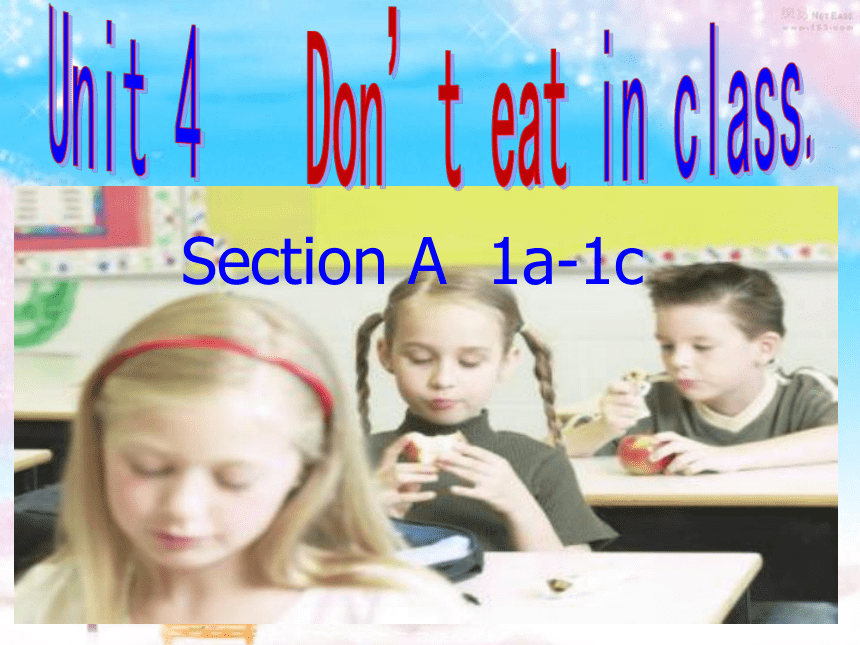 | |
| 格式 | zip | ||
| 文件大小 | 3.9MB | ||
| 资源类型 | 教案 | ||
| 版本资源 | 人教新目标(Go for it)版 | ||
| 科目 | 英语 | ||
| 更新时间 | 2022-03-04 21:07:25 | ||
图片预览

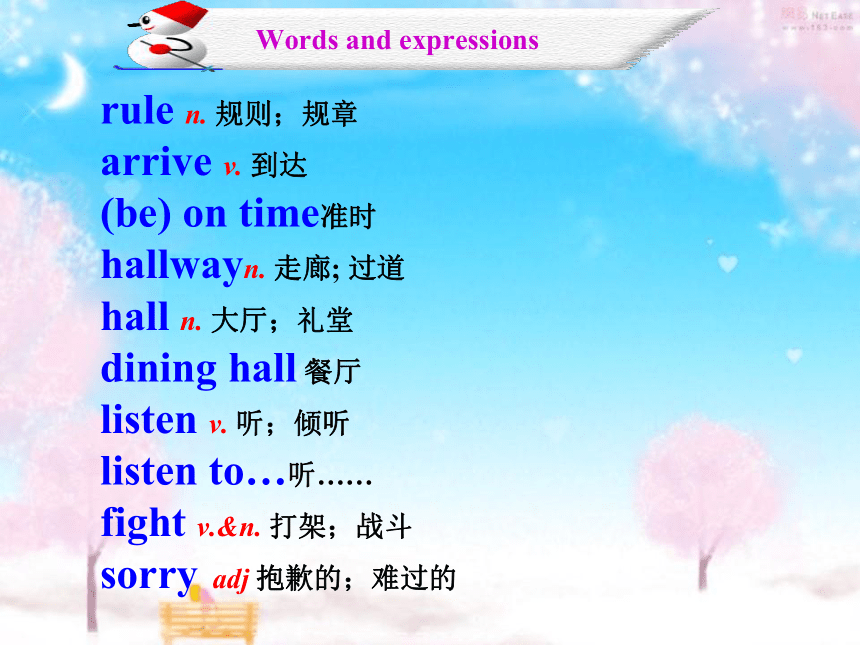
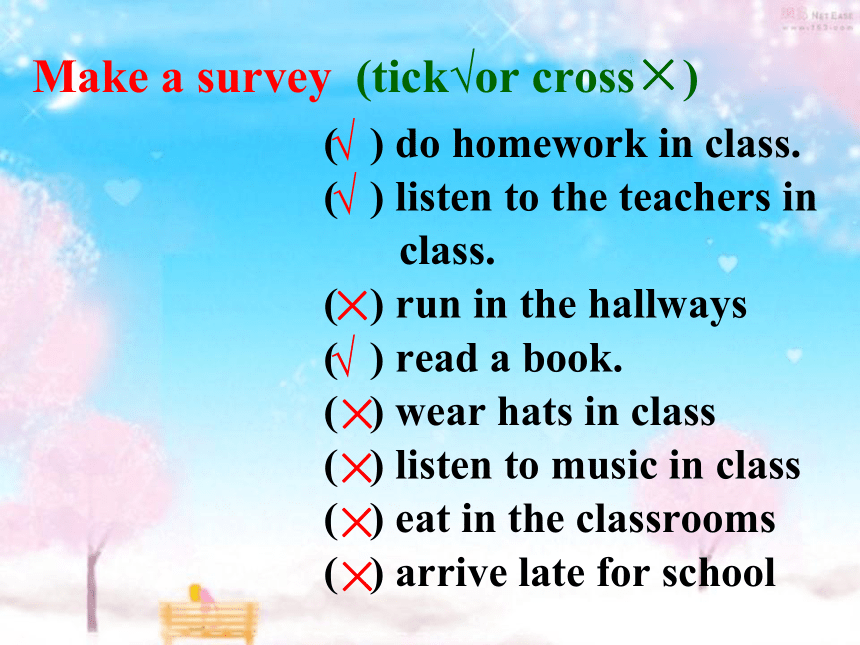
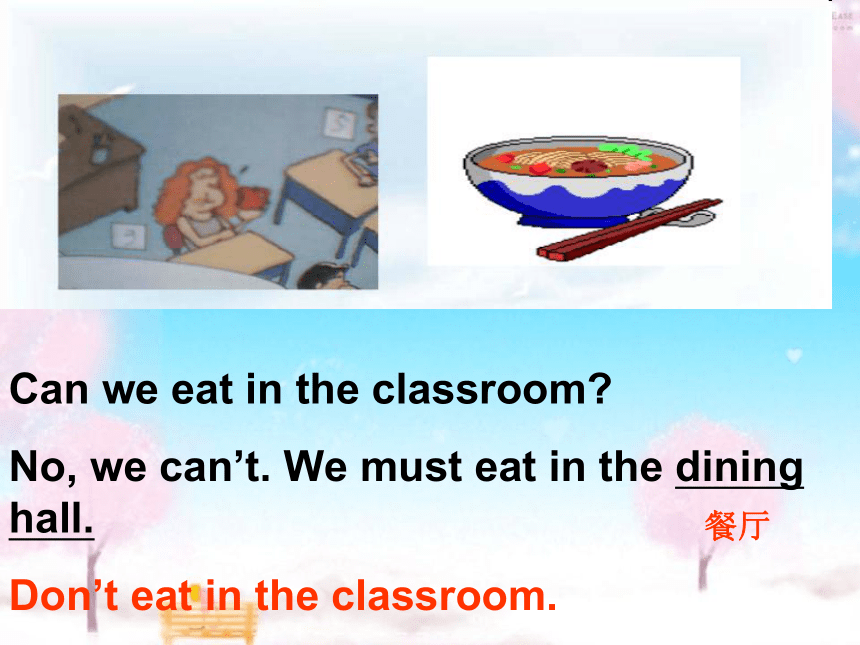
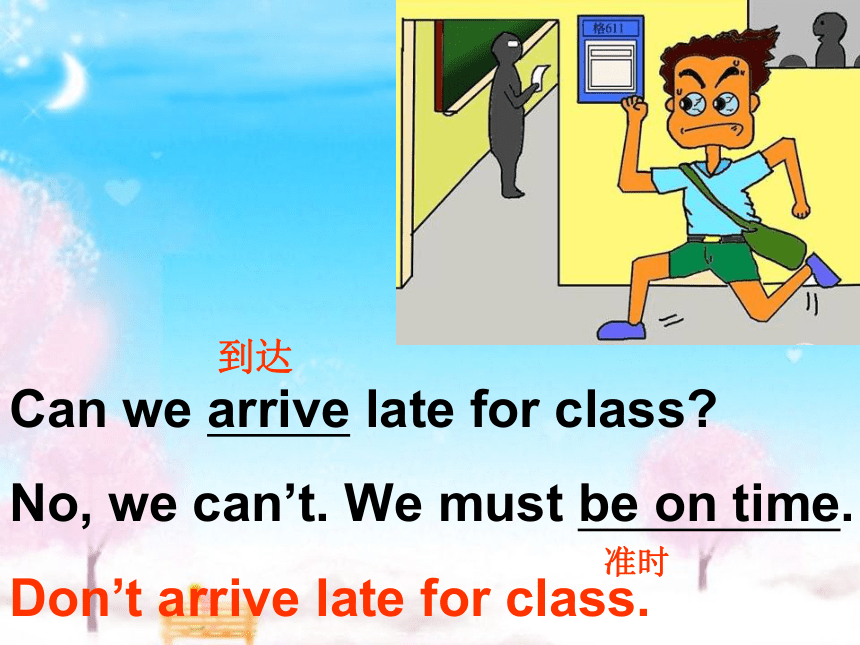
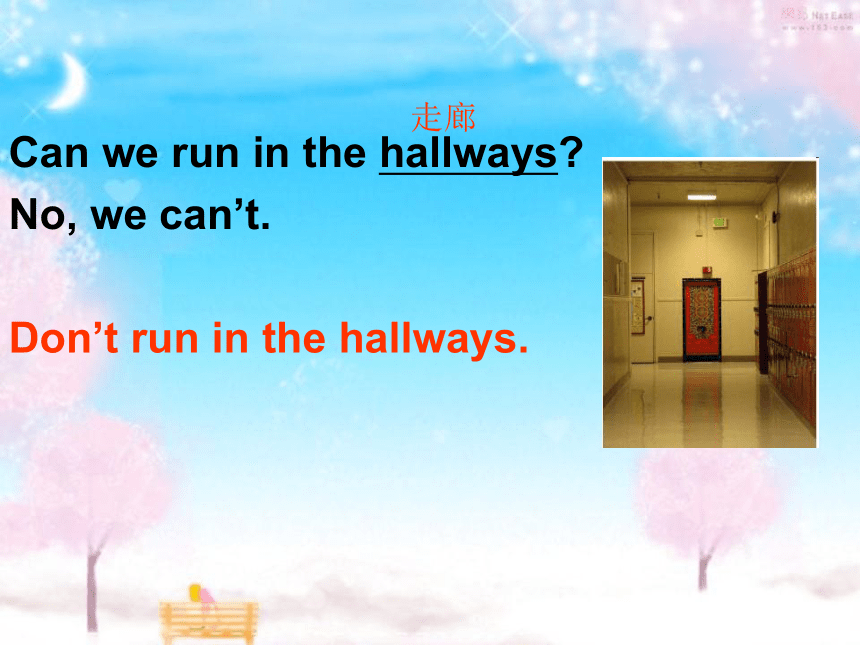
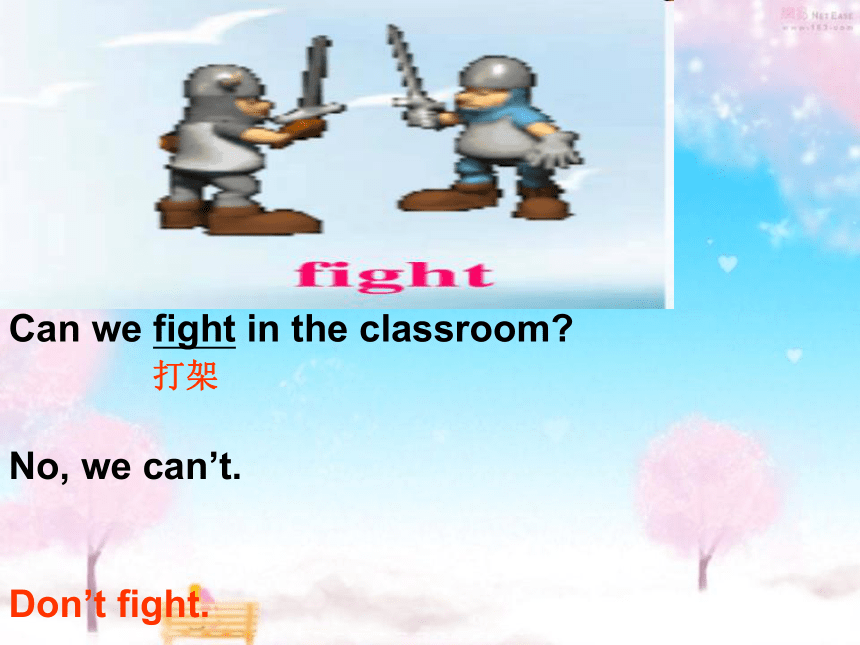
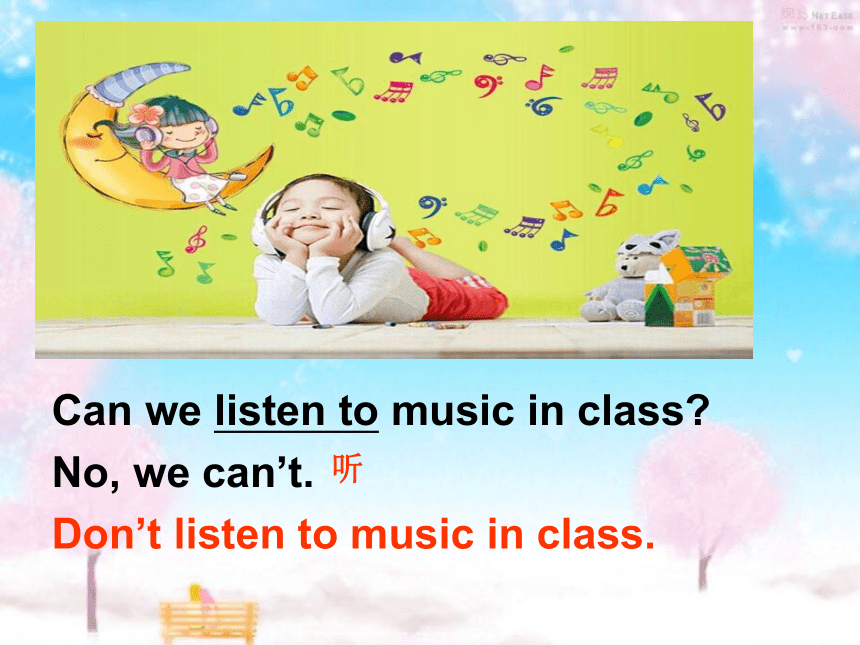
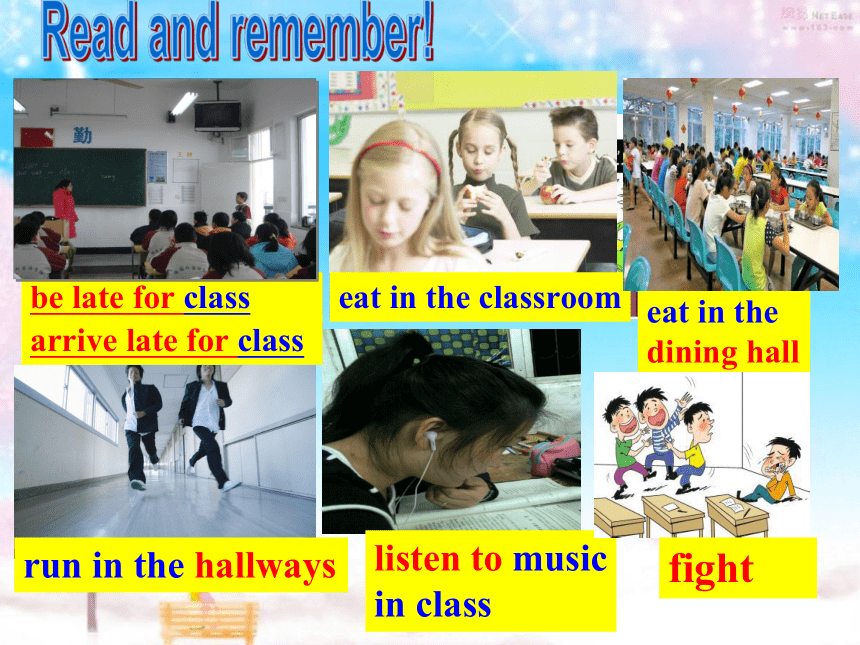
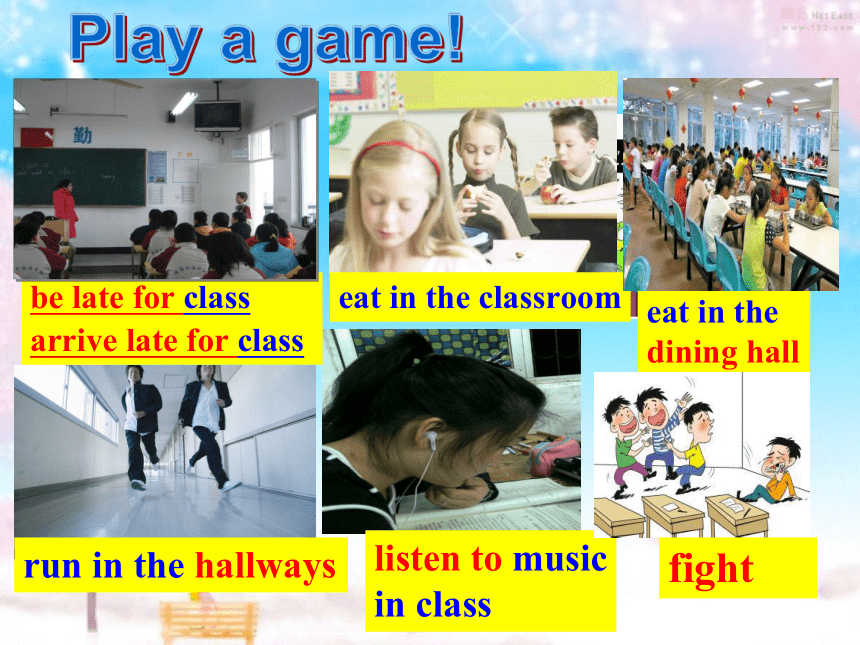
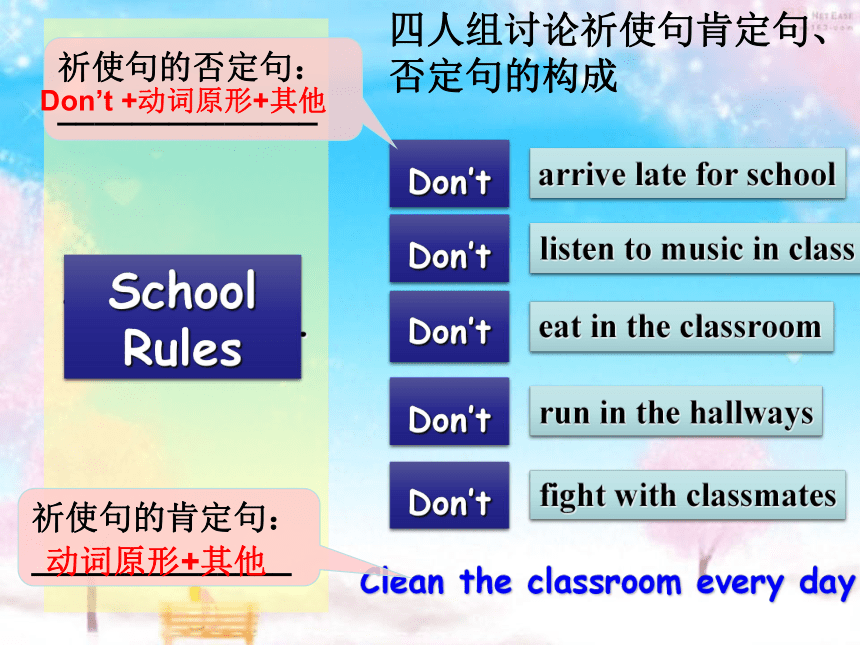
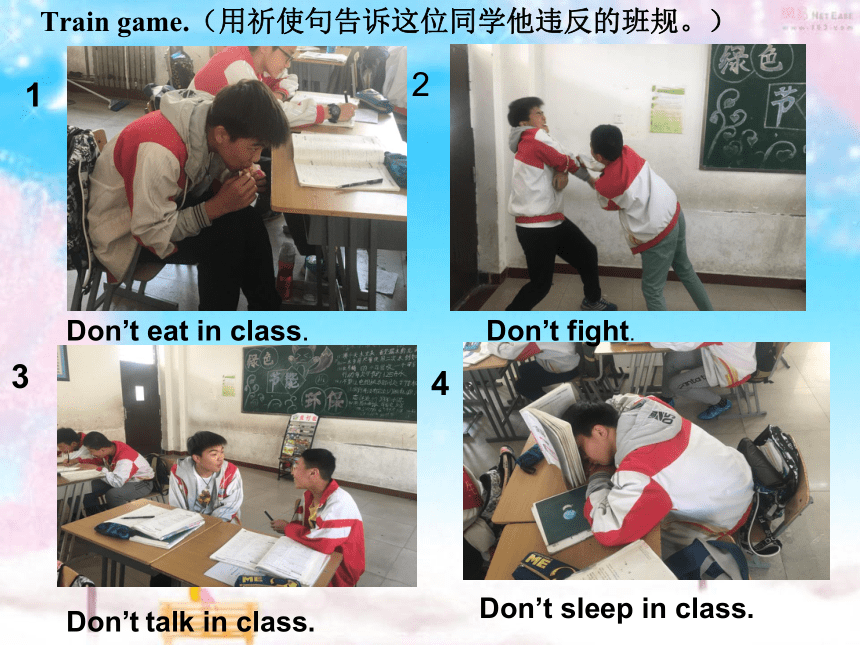
文档简介
(共40张PPT)
Unit 4 Don’t eat in class.
Section A 1a-1c
rule n. 规则;规章
arrive v. 到达
(be) on time准时
hallwayn. 走廊; 过道
hall n. 大厅;礼堂
dining hall 餐厅
listen v. 听;倾听
listen to…听……
fight v.&n. 打架;战斗
sorry adj 抱歉的;难过的
Words and expressions
Make a survey (tick√or cross×)
( ) do homework in class.
( ) listen to the teachers in class.
( ) run in the hallways
( ) read a book.
( ) wear hats in class
( ) listen to music in class
( ) eat in the classrooms
( ) arrive late for school
√
√
×
×
×
×
×
√
Can we eat in the classroom
No, we can’t. We must eat in the dining hall.
Don’t eat in the classroom.
餐厅
Can we arrive late for class
No, we can’t. We must be on time.
Don’t arrive late for class.
到达
准时
Can we run in the hallways
No, we can’t.
Don’t run in the hallways.
走廊
Can we fight in the classroom
No, we can’t.
Don’t fight.
打架
Can we listen to music in class
No, we can’t.
Don’t listen to music in class.
听
eat in the classroom
eat in the
dining hall
run in the hallways
listen to music
in class
be late for class
arrive late for class
fight
Read and remember!
eat in the classroom
eat in the
dining hall
run in the hallways
listen to music
in class
be late for class
arrive late for class
fight
Play a game!
run in the hallways
eat in the classroom
fight with classmates
You can’t…
School Rules
Don’t
Don’t
Don’t
Don’t
Don’t
祈使句的否定句:______________
Clean the classroom every day.
祈使句的肯定句:______________
Don’t +动词原形+其他
动词原形+其他
四人组讨论祈使句肯定句、否定句的构成
arrive late for school
listen to music in class
Train game.(用祈使句告诉这位同学他违反的班规。)
Don’t eat in class.
Don’t fight.
Don’t talk in class.
Don’t sleep in class.
1
2
3
4
1a Which rules are these students breaking
Write the number of the rule next to the
student.
2. Don’t run in the
hallways.
4. Don’t listen to
music in class.
5. Don’t fight.
1. Don’t arrive late for class. You must be on time.
4
3
2
5
3. Don’t eat in the
classroom. You must eat in the dining hall.
Peter ______ Amy ______ Mike ______
Listening
1b Listen. What rules are these
students breaking Write the
numbers after the names.
2
3
4
1. Don’t arrive late for class.You must be on time.
2. Don’t run in the hallways.
3. Don’t eat in the classroom.You
must eat in the dining hall.
4. Don’t listen to music in class.
5. Don’t fight.
School Rules
A: What are the rules
B: Well, we can’t arrive late for class. We must be on time.
Pairwork
1c
Discuss
Class Rules
1.__________________
2.__________________
3.__________________
4.__________________
5.__________________
6.__________________
7.__________________
…
You can begin with:
Don’t…
Do...
五、Groupwork
Don’t arrive late for
class.
1
2
3
4
5
6
7
8
9
10
11
What are the rules
in our school
1. 祈使句是表示请求、命令、叮嘱、号召、
劝告等的句子; 通常省略主语you; 句中谓语
动词用动词原形; 句尾一般用降调; 祈使句的
开头是动词原形。
祈使句有肯定和否定两种:
e.g. Look out! 小心!
Wait here for me! 在这等我!
Grammar
Come in, please! 请进!
Sit down, please. 请坐。
Let's go home. 我们回家吧。
否定的祈使句是在动词原形前(即句首)加Don't.
e.g. Don't talk in class! 不要在课常上讲话!
Don't open the window! 别开窗!
Don’t arrive late for school. 上学别迟到 !
Don’t smoke! 别吸烟!
2a.Check the activities Alan and
Cindy talk about.
Activity
1. ___ listen to music in the classroom or hallways can can’t
2. ___ listen to music in the music room can can’t
3. ___ listen to music outside can can’t
4. ___ eat in the classroom can can’t
5. ___ eat in the dinning hall can can’t
6. ___ eat outside can can’t
7. ___ wear a hat can can’t
8. ___ fight can can’t
√
√
√
√
√
√
√
listening
listen to music in the classroom or hallways
listen to music in music room
listen to music outside
eat in the classroom
eat in the dining hall
eat outside
wear a hat
fight
can can’t
can can’t
can can’t
can can’t
can can’t
can can’t
can can’t
can can’t
2b Listen again. Can Alan and Cindy do these activities Circle can or can’t above.
Can we ......, Cindy
Yes, we can.
No, we can't.But we can...
Student A is Alan. Student B is Cindy. Talk about the rules in 2a.
Work in pairs
Who has a good memory
谁的记忆力好?
What rules are they breaking
1.What are John and Alice talking about
___________
2. Is John new at school
___________
2d Read the conversation in 2d and answer the questions.
Yes, he is.
Reading
School rules.
3. Are there many rules at school
______________
4.How many rules does Alice mention?
______________
5. Can he bring music players to school
_______________
6. Do they have to always wear the school uniform
_______________
No, he can’t.
Yes, they do.
Yes, there are.
Four.
提到
带 来
不得不,必须
music player
uniforms
n. 制服
wear a hat
戴帽子
be quiet保持安静
outside adv. 外出
New words
音乐播放器
Role-play the conversation.
John: Hi, my name’s John. It’s my first day at school.
Alice: Hi, John. I’m Alice. This is a great school, but
there are a lot of rules.
John: Really What are some of the rules
Alice: Well, don’t be late for the class. This is very
important.
John: OK, so we must be on time. Can we bring
music players to school
Alice: No, we can’t. And we always have to wear the
school uniform.
John: I see.
Alice: Oh, and we also have to be quiet in the library.
我上学的第一天
重要的 adj.
v.带来
保持安静
Practice:
--Do you have to...in the school
--Yes, we do. We have to....
--No, we don't. We don't have to...
clean the classroom every day
do morning exercises every day
listen to the teachers in class
have classes every day
have to与must
have to着重于客观的需要,含有“不得不”的客观强制性;must着重于主观上自己认为有义务、有必要。
如:
She has to clean the room every week.
她每周都得打扫房间。
I must go now.
Language point:
含有have to的句子变一般疑问句或否定句时要借助助动词do / don’t或does / doesn’t;而含有must的句子变一般疑问句是直接将must提前至句首,变否定句是在must后加not。如:
He doesn’t have to do it. 他不必做那件事。
He mustn’t do it. 他不许做那件事。
Does he have to do it
他不得不做那件事吗?
Must he do his homework
他必须做他的作业吗?
在否定句中,don’t / doesn’t have to表示“没有必要”,must not / mustn’t表示“不允许”。如:
You don’t have to go there.
你不必去那儿。
You must not / mustn’t go there.
你不许去那儿。
练一练:用have to, must 填空
1. It’s cold outside. We ______ stay at home.
have to
must
2. We ____ be good with our parents.
(1)Wear the school uniform.
(2)Write or draw on the wall.(墙)
(3)Use mobile phones. (使用手机)
(4)Sleep in the classroom after lunch.
(5)Play cards in school.
(6)Play with chalk.(粉笔)
(7)Watch TV on school nights.
(8)Read books in the classroom.
Can we...
Yes, we can.
No, we can't.
Discussion
(Yes)
(No)
(No)
(Yes)(No)
(No)
(No)
(Yes)
1. Sit down.
2. Come in.
3. Eat at home.
Don’t sit down.
Don’t come in.
Don’t eat at home.
1. 把下列祈使句改成否定句
Practice:
4. Listen to music outside.
5. Do your homework at school.
Don’t listen to music outside.
Don’t do your homework at school.
1. late, don't, for school, arrive
2. music, listen to, in the classroom, don't
3. eat, can't, in the classroom, we
Don’t arrive late for school.
Don’t listen to music in the classroom.
We can’t eat in the classroom.
Ⅲ. Form sentences. 组句
1. _______ fight with others.
A. Not B. No C. Don’t D. Doesn’t
2.---_____we eat in the dining hall ---Yes, we_____
A. Do, does B. Can, do C. Do, can D. Can, can
3. You can’t eat _____ outside.
A. at B. \ C. in D. on
4.Listen to music in hallways.(改为否定句)
listen to music in hallways.
Don’t
Stop!
Fill in the blank of school rules:
1. Don’t _________late for class/school.
3. Don’t run_______________.
5. We ____________________ in class.
4. _____ the classroom after class.
2. ______eat in class.
6.We ______ wear the school uniform
arrive
in the hallways
have to
Don’t
Clean
can’t play basketball
根据各题后括号内的要求完成下列各题。
1. He has to wear the school uniform at school. (改为一般疑问句)
_____ he ________ wear the school uniform at school
2. They have to do too much homework every day. (改为否定句)
They ______________ do too much homework every day.
3. We must finish our work now. (改为一般疑问句)
______ we ________ our work now
Does
have to
don’t have to
Must
finish
1. No talking! (改成同义句)
_________ ________, please!
2. The man behind the white car is his
father.(对画线部分提问)
_________ _________ is his father
Don’t talk
Which man
按要求改写下列句子。
句型练习
3. She read the book under the tree yesterday afternoon. (改成一般疑问句)
_________ she _________ the book under the tree yesterday afternoon
4. Do your homework at school. (改为否定句)
_________ _________ your homework at school.
5. My friend showed me his nice pen. (改成同义句)
My friend ___________ his nice pen ____________ me.
Did read
Don’t do
showed to
Unit 4 Don’t eat in class.
Section A 1a-1c
rule n. 规则;规章
arrive v. 到达
(be) on time准时
hallwayn. 走廊; 过道
hall n. 大厅;礼堂
dining hall 餐厅
listen v. 听;倾听
listen to…听……
fight v.&n. 打架;战斗
sorry adj 抱歉的;难过的
Words and expressions
Make a survey (tick√or cross×)
( ) do homework in class.
( ) listen to the teachers in class.
( ) run in the hallways
( ) read a book.
( ) wear hats in class
( ) listen to music in class
( ) eat in the classrooms
( ) arrive late for school
√
√
×
×
×
×
×
√
Can we eat in the classroom
No, we can’t. We must eat in the dining hall.
Don’t eat in the classroom.
餐厅
Can we arrive late for class
No, we can’t. We must be on time.
Don’t arrive late for class.
到达
准时
Can we run in the hallways
No, we can’t.
Don’t run in the hallways.
走廊
Can we fight in the classroom
No, we can’t.
Don’t fight.
打架
Can we listen to music in class
No, we can’t.
Don’t listen to music in class.
听
eat in the classroom
eat in the
dining hall
run in the hallways
listen to music
in class
be late for class
arrive late for class
fight
Read and remember!
eat in the classroom
eat in the
dining hall
run in the hallways
listen to music
in class
be late for class
arrive late for class
fight
Play a game!
run in the hallways
eat in the classroom
fight with classmates
You can’t…
School Rules
Don’t
Don’t
Don’t
Don’t
Don’t
祈使句的否定句:______________
Clean the classroom every day.
祈使句的肯定句:______________
Don’t +动词原形+其他
动词原形+其他
四人组讨论祈使句肯定句、否定句的构成
arrive late for school
listen to music in class
Train game.(用祈使句告诉这位同学他违反的班规。)
Don’t eat in class.
Don’t fight.
Don’t talk in class.
Don’t sleep in class.
1
2
3
4
1a Which rules are these students breaking
Write the number of the rule next to the
student.
2. Don’t run in the
hallways.
4. Don’t listen to
music in class.
5. Don’t fight.
1. Don’t arrive late for class. You must be on time.
4
3
2
5
3. Don’t eat in the
classroom. You must eat in the dining hall.
Peter ______ Amy ______ Mike ______
Listening
1b Listen. What rules are these
students breaking Write the
numbers after the names.
2
3
4
1. Don’t arrive late for class.You must be on time.
2. Don’t run in the hallways.
3. Don’t eat in the classroom.You
must eat in the dining hall.
4. Don’t listen to music in class.
5. Don’t fight.
School Rules
A: What are the rules
B: Well, we can’t arrive late for class. We must be on time.
Pairwork
1c
Discuss
Class Rules
1.__________________
2.__________________
3.__________________
4.__________________
5.__________________
6.__________________
7.__________________
…
You can begin with:
Don’t…
Do...
五、Groupwork
Don’t arrive late for
class.
1
2
3
4
5
6
7
8
9
10
11
What are the rules
in our school
1. 祈使句是表示请求、命令、叮嘱、号召、
劝告等的句子; 通常省略主语you; 句中谓语
动词用动词原形; 句尾一般用降调; 祈使句的
开头是动词原形。
祈使句有肯定和否定两种:
e.g. Look out! 小心!
Wait here for me! 在这等我!
Grammar
Come in, please! 请进!
Sit down, please. 请坐。
Let's go home. 我们回家吧。
否定的祈使句是在动词原形前(即句首)加Don't.
e.g. Don't talk in class! 不要在课常上讲话!
Don't open the window! 别开窗!
Don’t arrive late for school. 上学别迟到 !
Don’t smoke! 别吸烟!
2a.Check the activities Alan and
Cindy talk about.
Activity
1. ___ listen to music in the classroom or hallways can can’t
2. ___ listen to music in the music room can can’t
3. ___ listen to music outside can can’t
4. ___ eat in the classroom can can’t
5. ___ eat in the dinning hall can can’t
6. ___ eat outside can can’t
7. ___ wear a hat can can’t
8. ___ fight can can’t
√
√
√
√
√
√
√
listening
listen to music in the classroom or hallways
listen to music in music room
listen to music outside
eat in the classroom
eat in the dining hall
eat outside
wear a hat
fight
can can’t
can can’t
can can’t
can can’t
can can’t
can can’t
can can’t
can can’t
2b Listen again. Can Alan and Cindy do these activities Circle can or can’t above.
Can we ......, Cindy
Yes, we can.
No, we can't.But we can...
Student A is Alan. Student B is Cindy. Talk about the rules in 2a.
Work in pairs
Who has a good memory
谁的记忆力好?
What rules are they breaking
1.What are John and Alice talking about
___________
2. Is John new at school
___________
2d Read the conversation in 2d and answer the questions.
Yes, he is.
Reading
School rules.
3. Are there many rules at school
______________
4.How many rules does Alice mention?
______________
5. Can he bring music players to school
_______________
6. Do they have to always wear the school uniform
_______________
No, he can’t.
Yes, they do.
Yes, there are.
Four.
提到
带 来
不得不,必须
music player
uniforms
n. 制服
wear a hat
戴帽子
be quiet保持安静
outside adv. 外出
New words
音乐播放器
Role-play the conversation.
John: Hi, my name’s John. It’s my first day at school.
Alice: Hi, John. I’m Alice. This is a great school, but
there are a lot of rules.
John: Really What are some of the rules
Alice: Well, don’t be late for the class. This is very
important.
John: OK, so we must be on time. Can we bring
music players to school
Alice: No, we can’t. And we always have to wear the
school uniform.
John: I see.
Alice: Oh, and we also have to be quiet in the library.
我上学的第一天
重要的 adj.
v.带来
保持安静
Practice:
--Do you have to...in the school
--Yes, we do. We have to....
--No, we don't. We don't have to...
clean the classroom every day
do morning exercises every day
listen to the teachers in class
have classes every day
have to与must
have to着重于客观的需要,含有“不得不”的客观强制性;must着重于主观上自己认为有义务、有必要。
如:
She has to clean the room every week.
她每周都得打扫房间。
I must go now.
Language point:
含有have to的句子变一般疑问句或否定句时要借助助动词do / don’t或does / doesn’t;而含有must的句子变一般疑问句是直接将must提前至句首,变否定句是在must后加not。如:
He doesn’t have to do it. 他不必做那件事。
He mustn’t do it. 他不许做那件事。
Does he have to do it
他不得不做那件事吗?
Must he do his homework
他必须做他的作业吗?
在否定句中,don’t / doesn’t have to表示“没有必要”,must not / mustn’t表示“不允许”。如:
You don’t have to go there.
你不必去那儿。
You must not / mustn’t go there.
你不许去那儿。
练一练:用have to, must 填空
1. It’s cold outside. We ______ stay at home.
have to
must
2. We ____ be good with our parents.
(1)Wear the school uniform.
(2)Write or draw on the wall.(墙)
(3)Use mobile phones. (使用手机)
(4)Sleep in the classroom after lunch.
(5)Play cards in school.
(6)Play with chalk.(粉笔)
(7)Watch TV on school nights.
(8)Read books in the classroom.
Can we...
Yes, we can.
No, we can't.
Discussion
(Yes)
(No)
(No)
(Yes)(No)
(No)
(No)
(Yes)
1. Sit down.
2. Come in.
3. Eat at home.
Don’t sit down.
Don’t come in.
Don’t eat at home.
1. 把下列祈使句改成否定句
Practice:
4. Listen to music outside.
5. Do your homework at school.
Don’t listen to music outside.
Don’t do your homework at school.
1. late, don't, for school, arrive
2. music, listen to, in the classroom, don't
3. eat, can't, in the classroom, we
Don’t arrive late for school.
Don’t listen to music in the classroom.
We can’t eat in the classroom.
Ⅲ. Form sentences. 组句
1. _______ fight with others.
A. Not B. No C. Don’t D. Doesn’t
2.---_____we eat in the dining hall ---Yes, we_____
A. Do, does B. Can, do C. Do, can D. Can, can
3. You can’t eat _____ outside.
A. at B. \ C. in D. on
4.Listen to music in hallways.(改为否定句)
listen to music in hallways.
Don’t
Stop!
Fill in the blank of school rules:
1. Don’t _________late for class/school.
3. Don’t run_______________.
5. We ____________________ in class.
4. _____ the classroom after class.
2. ______eat in class.
6.We ______ wear the school uniform
arrive
in the hallways
have to
Don’t
Clean
can’t play basketball
根据各题后括号内的要求完成下列各题。
1. He has to wear the school uniform at school. (改为一般疑问句)
_____ he ________ wear the school uniform at school
2. They have to do too much homework every day. (改为否定句)
They ______________ do too much homework every day.
3. We must finish our work now. (改为一般疑问句)
______ we ________ our work now
Does
have to
don’t have to
Must
finish
1. No talking! (改成同义句)
_________ ________, please!
2. The man behind the white car is his
father.(对画线部分提问)
_________ _________ is his father
Don’t talk
Which man
按要求改写下列句子。
句型练习
3. She read the book under the tree yesterday afternoon. (改成一般疑问句)
_________ she _________ the book under the tree yesterday afternoon
4. Do your homework at school. (改为否定句)
_________ _________ your homework at school.
5. My friend showed me his nice pen. (改成同义句)
My friend ___________ his nice pen ____________ me.
Did read
Don’t do
showed to
同课章节目录
- Unit 1 Can you play the guitar?
- Section A
- Section B
- Unit 2 What time do you go to school?
- Section A
- Section B
- Unit 3 How do you get to school?
- Section A
- Section B
- Unit 4 Don't eat in class.
- Section A
- Section B
- Unit 5 Why do you like pandas?
- Section A
- Section B
- Unit 6 I'm watching TV.
- Section A
- Section B
- Review of Units 1-6
- Unit 7 It's raining!
- Section A
- Section B
- Unit 8 Is there a post office near here?
- Section A
- Section B
- Unit 9 What does he look like?
- Section A
- Section B
- Unit 10 I'd like some noodles.
- Section A
- Section B
- Unit 11 How was your school trip?
- Section A
- Section B
- Unit 12 What did you do last weekend?
- Section A
- Section B
